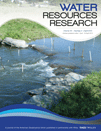
WATER RESOURCES RESEARCH
Scope & Guideline
Shaping Sustainable Practices through Rigorous Research
Introduction
Aims and Scopes
- Hydrological Modeling and Predictions:
The journal emphasizes hydrological modeling techniques, including the development and application of process-based models to simulate water flow and quality across various scales and conditions. - Water Quality and Pollution Dynamics:
Research on water quality, including the dynamics of pollutants, nutrient cycling, and the impact of land use on water bodies, is a core focus, aiming to understand and mitigate water pollution. - Climate Change and Water Resources:
The journal addresses the impacts of climate change on hydrological cycles, water availability, and the sustainability of water resources, highlighting adaptive management strategies. - Groundwater Studies:
Groundwater research, including recharge dynamics, aquifer management, and the interaction between groundwater and surface water, is a significant area of interest. - Water Resource Management and Policy:
The journal includes studies on water resource management practices, policies, and socio-economic impacts, aiming to inform decision-making for sustainable water use. - Technological Innovations in Water Research:
It encourages the use of innovative technologies such as remote sensing, machine learning, and in-situ monitoring to enhance water resource studies.
Trending and Emerging
- Machine Learning and Data Science Applications:
There is a growing trend in applying machine learning and data science methodologies to analyze and predict hydrological phenomena, enhancing model accuracy and efficiency. - Integrated Water Resource Management (IWRM):
Research emphasizing IWRM approaches that consider the interconnections between water, land, and ecosystems is increasingly prominent, reflecting a holistic view of water resource sustainability. - Climate Resilience and Adaptation Strategies:
Studies focusing on developing resilience and adaptation strategies in response to climate change impacts on water resources are becoming more prevalent, highlighting the need for proactive management. - Hydrological Responses to Land Use Change:
Research examining how land use changes, including urbanization and agricultural practices, affect hydrological cycles is gaining traction, with a focus on sustainability and ecological impacts. - Remote Sensing and Monitoring Technologies:
The use of advanced remote sensing technologies for monitoring water quality, quantity, and hydrological processes is trending, providing new insights into water resource dynamics.
Declining or Waning
- Traditional Water Supply Systems:
Research focused on conventional water supply systems and infrastructure is declining as newer models and technologies for water management gain prominence. - Static Water Quality Assessments:
There is a noticeable decrease in studies that involve static assessments of water quality without considering dynamic environmental factors and climate interactions. - Historical Water Resource Analysis:
While historical studies are important, there is a waning focus on purely historical analyses of water resources without integration into current or predictive modeling frameworks. - Simple Empirical Models:
The reliance on simple empirical models for hydrological predictions is decreasing, as there is a shift towards more complex, multi-faceted modeling approaches that incorporate various factors. - Localized Case Studies:
The trend has shifted from localized case studies to more extensive, comparative research that examines broader regional or global trends in water resources.
Similar Journals

Hydrology Research
Innovative insights into hydrological processes.Hydrology Research, a leading academic journal published by IWA Publishing, is dedicated to advancing the field of water science and technology. With an impressive impact factor and a Q2 ranking in its category, the journal plays a pivotal role in disseminating innovative research and practices in hydrology. Established in 1973 and transitioning to an Open Access model in 2020, it provides unrestricted access to high-quality articles that cover a broad spectrum of topics, including hydrological processes, water management, and environmental impact assessments. Situated in Denmark, Hydrology Research continues to thrive as an essential platform for researchers, professionals, and students alike, encouraging the exchange of ideas that contribute to sustainable water solutions worldwide. With a comprehensive coverage of research converging from 1973 to 2024, it stands as a testament to ongoing progress in the water science community.

Hydrologie und Wasserbewirtschaftung
Exploring the depths of water management.Hydrologie und Wasserbewirtschaftung, published by the BUNDESANSTALT GEWASSERKUNDE-BFG, stands as a vital open access journal in the field of hydrology and water management since its inception in 1999. Based in Germany, this journal aims to disseminate high-quality research related to water resources, environmental sustainability, and innovative management strategies. Though it has a Q4 ranking in Water Science and Technology for 2023, and holds a Scopus rank of 113 out of 225, the journal provides an essential platform for researchers, professionals, and students interested in advancing their understanding of water science. With coverage spanning from 1999 to 2018 and a seamless move to an open access model, Hydrologie und Wasserbewirtschaftung remains committed to contributing to the ongoing dialogue around critical water issues. Researchers looking to publish their findings or stay abreast of developments in water science will find this journal indispensable.
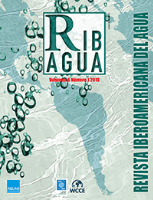
RIBAGUA-Revista Iberoamericana del Agua
Empowering voices in the Ibero-American water discourse.RIBAGUA-Revista Iberoamericana del Agua is an esteemed academic journal dedicated to the study and dissemination of water-related research within the Ibero-American context. Published by TAYLOR & FRANCIS LTD, this Open Access journal has been providing a platform for scholarly articles since 2015, promoting visibility and accessibility for researchers, professionals, and students engaged in environmental science, hydrology, and water resource management. With the objective of enhancing the understanding of water issues affecting the Ibero-American region, RIBAGUA invites contributions that address innovative practices, policy implications, and scientific advancements. By fostering inter-regional dialogue and collaboration, it stands as a vital resource for those looking to contribute to sustainable water management solutions. The journal is committed to maintaining high standards of academic integrity and is ideal for anyone seeking to advance their knowledge and research in the water sciences.
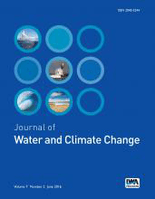
Journal of Water and Climate Change
Bridging Water Wisdom and Climate InsightsJournal of Water and Climate Change is a premier open-access journal published by IWA Publishing, dedicated to advancing the understanding of the interplay between water resources and climate change. With an ISSN of 2040-2244 and an E-ISSN of 2408-9354, this journal has established itself as a crucial platform for interdisciplinary research, publishing high-quality articles that address the challenges posed by climate variability on water systems globally. Since achieving open access status in 2021, the journal has fostered wider dissemination of knowledge among its audience, featuring works that span pivotal topics in Atmospheric Science, Global and Planetary Change, and Water Management. Notably ranked within the top quartiles in several relevant categories as of 2023, it occupies a vital position in the academic community, offering insights that are essential for policymakers, environmental scientists, and researchers striving to create sustainable solutions for water and climate challenges. Its commitment to excellence is reflected in its strong Scopus rankings, standing at the 66th percentile in Water Science and Technology and 65th percentile in Management, Monitoring, Policy, and Law. Located in the United Kingdom, this journal not only serves as a repository of cutting-edge research from 2010 to 2024 but also engages a diverse readership passionate about promoting sustainable water management practices.

RBRH-Revista Brasileira de Recursos Hidricos
Championing Open Access to Vital Water ResearchRBRH-Revista Brasileira de Recursos Hidricos is a leading peer-reviewed journal dedicated to the dissemination of high-quality research in the field of water resources, published by the Associação Brasileira de Recursos Hídricos (ABRH). With both ISSN 1414-381X and E-ISSN 2318-0331, this journal has established itself as an essential resource since its transition to Open Access in 1996, fostering widespread accessibility to vital research findings. Based in Brazil, the journal serves a global audience, embodying a commitment to the study and management of aquatic systems, including their dynamics and technological solutions. As part of its rigorous academic contributions, it has achieved Q3 rankings across categories such as Aquatic Science, Earth-Surface Processes, Oceanography, and Water Science & Technology, reflecting its impact and relevance in these domains. Researchers, professionals, and students are encouraged to engage with the journal's diverse array of studies from 2016 to 2024, consolidating knowledge on crucial water resource challenges and innovations.
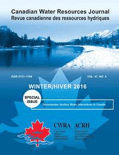
Canadian Water Resources Journal
Pioneering research for a clearer water future.Canadian Water Resources Journal, published by Taylor & Francis Inc, is a leading academic journal dedicated to the field of water science and technology. With a significant history dating back to its inception in 1976, the journal offers a platform for high-quality, peer-reviewed research that addresses critical issues in water resources management, hydrology, water quality, and policy. The journal is recognized for its valuable contributions to the field, exemplified by its classification in the Q2 category for Water Science and Technology and holding a respectable rank of #137 out of 261 in the Scopus Environmental Science category. While it does not currently offer open access, its articles remain accessible through various institutional subscriptions, ensuring that professionals, researchers, and students stay updated with the latest advancements and discussions in water resources. As it converges towards its ongoing publication commitment through 2024, the Canadian Water Resources Journal remains an essential resource for those engaged in the pursuit of sustainable water management solutions.

Journal of Water Management Modeling
Advancing Knowledge in Civil Engineering and Water TechnologyThe Journal of Water Management Modeling, published by COMPUTATIONAL HYDRAULICS INT, stands as a pivotal resource in the fields of Civil and Structural Engineering, Geography, Planning and Development, and Water Science and Technology. With an ISSN of 2292-6062, this Canadian-based journal has earned its reputation by exploring innovative modeling approaches to enhance water management, crucial in addressing today's environmental challenges. Despite its current Q3 status in Civil and Structural Engineering and Water Science categories, alongside a respectable Q2 rank in Geography, the journal is committed to advancing knowledge and fostering collaboration among researchers, practitioners, and students passionate about the sustainable management of water resources. The journal operates on an open-access model, ensuring research is readily available to a broad audience, and has converged its editorial focus from 2018 to 2024, continuously adapting to emerging trends and technologies within the discipline. As a part of the global conversation regarding effective water management, it plays a vital role in informing policies and practices that impact communities and ecosystems alike.

Hydrology
Advancing water science for a sustainable future.Hydrology, published by MDPI, is a prominent open-access journal dedicated to advancing the field of hydrological science. Since its establishment in 2014, the journal has garnered a reputation for excellence, reflected in its classification within the Q2 quartile for 2023 across multiple categories including Earth-Surface Processes, Oceanography, Water Science and Technology, and Waste Management and Disposal. Based in Switzerland, Hydrology provides a vital platform for scholars and practitioners to disseminate research findings, promote innovative methodologies, and foster discussions on current trends affecting water resources and management globally. The journal is easily accessible online and aims to significantly contribute to the understanding of hydrological processes, offering insights that are pivotal for addressing contemporary environmental challenges. With Scopus rankings showcasing its growing influence, Hydrology is a crucial resource for researchers, students, and professionals committed to water science and sustainable practices.

JOURNAL OF THE AMERICAN WATER RESOURCES ASSOCIATION
Connecting researchers and practitioners in the vital realm of water resources.The JOURNAL OF THE AMERICAN WATER RESOURCES ASSOCIATION, published by Wiley, is a premier platform dedicated to advancing the field of water resource management and research. With an ISSN of 1093-474X and an impressive Q1 ranking in multiple categories, including Earth-Surface Processes, Ecology, and Water Science and Technology, this journal serves as a vital resource for professionals, researchers, and students alike. Established in 1967 and set to converge through 2024, it has consistently published cutting-edge research that influences policy and practice in water resource management. The journal's open access option enhances its reach, ensuring that critical findings are accessible to a wider audience. The Scopus rankings further underscore its impact, placing it in the top quartile within its fields, highlighting its importance in shaping scholarly discourse. As a significant contributor to the understanding and management of freshwater systems, the journal offers a crucial means for sharing insights and fostering collaboration in the vital realm of water resources.
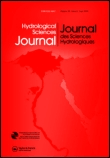
Hydrological Sciences Journal
Pioneering research in the realm of water management.Hydrological Sciences Journal, published by Taylor & Francis Ltd, is a leading peer-reviewed publication dedicated to advancing the field of hydrology, spanning topics from water management to climate impacts on hydrological systems. With an impressive impact factor and a noted Q1 category ranking in Water Science and Technology, the journal occupies a pivotal role in the academic landscape, facilitating high-quality research dissemination since its inception in 1982. The journal is indexed in Scopus, holding a commendable rank of #48 out of 261 in the Environmental Science category, placing it in the 81st percentile among its peers. Although it does not offer Open Access options, the journal ensures extensive reach and readership through institutional subscriptions. As it converges toward its milestone of 2024, the Hydrological Sciences Journal remains an indispensable resource for researchers, professionals, and students eager to explore the latest advancements and methodologies in hydrological research.